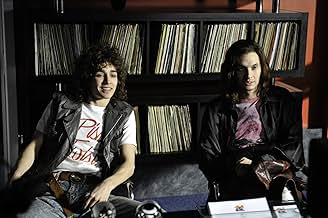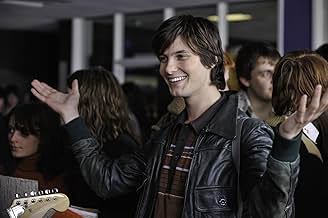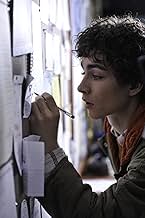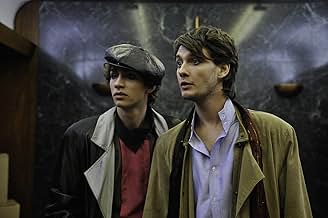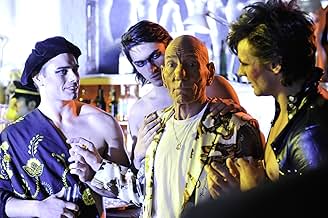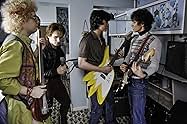AVALIAÇÃO DA IMDb
6,3/10
6,8 mil
SUA AVALIAÇÃO
Adicionar um enredo no seu idiomaTwo brothers attempt to become global rock stars but can only look on as old school friends U2 become the biggest band in the world.Two brothers attempt to become global rock stars but can only look on as old school friends U2 become the biggest band in the world.Two brothers attempt to become global rock stars but can only look on as old school friends U2 become the biggest band in the world.
- Direção
- Roteiristas
- Artistas
Seán Duggan
- Liam
- (as Sean Duggan)
Avaliações em destaque
I can see how some people may get annoyed at the protagonist of this story. "Killing Bono" is the story of a chronic loser, and from the outset, he makes every bad choice possible, repeats his bad choices, blows just about every golden opportunity to redeem himself. And all the while he cockily convinces himself that he is the last great idealist on the planet. Who would want to sit through 2 hours of this??
Answer: YOU.
Maybe it's Ben Barnes' charming portrayal of the loser (a bit like John Ritter's charming loser character Jack Tripper on "Three's Company"), maybe it's the wonderfully acidic script, maybe it's the parade of lovably bizarre characters, or maybe it's the suspense of wanting to know if he actually does kill Bono, as the title & opening flash-forward scene tease us. Whatever it is, something about this film will keep you interested & entertained until the very second the end credits roll.
Loosely, very loosely based on the memoirs of Bono's 70s school chum and rival rockstar Neil McCormick, this film depicts some true events such as the anemic rise of Neil's 80s pop band "Shook Up!" (they weren't half bad, check out their videos on youtube) and some not-so-true events that really spice things up in the third act. But since this is a comedy, the fictionalizations are strangely believable if not central to the point of the movie.
"This is not a true story. It is crucial to say that," says director Nick Hamm in the DVD bonus featurette. "You can be real to the story you're telling, but your story doesn't have to be real."
The real Neil McCormick, when asked about the fictional aspects, sheepishly approved: "We all fictionalise ourselves ... I created a version of myself to suit my book ... Now, someone has created an alternative version. As a deluded, fame-obsessed young man, of course, I never doubted that one day someone would make a film of my life. It just never occurred to me it would be a comedy."
That it is. A brilliant & entertaining comedy with a compelling theme driving it. Not many comedies have been able to portray the story of a loser in a fun, vibrant way. But if you're familiar with the obscure gems "Buffalo 66", the documentary "Anvil! The Story of Anvil" or the Aussie rocker "Garage Days", you'll have an idea of the treat you have in store here.
A final note about the music: I think it features only one U2 song ("Still Haven't Found What I'm Looking For"), but there are some atmospheric bits that sound hauntingly like U2. There's one song by Neil's band Shook Up! entitled "Stop the World", and most of the other songs seem to be new compositions (or new versions) that actually feature Ben Barnes singing. U2 fans may be disappointed because this is not a movie about U2, although it revolves closely around them. In that respect it's a lot like another great comedy "Grand Theft Parsons" about famed singer Gram Parsons' good friend who decides to steal Gram's body after his death.
"Killing Bono" is a creatively-told fiction that flirts with truth but ultimately takes us in the opposite direction. Hey, this formula worked in "Amadeus" (Mozart), "Immortal Beloved" (Beethoven) and "Impromptu" (Chopin). Sure, why not Bono?
Answer: YOU.
Maybe it's Ben Barnes' charming portrayal of the loser (a bit like John Ritter's charming loser character Jack Tripper on "Three's Company"), maybe it's the wonderfully acidic script, maybe it's the parade of lovably bizarre characters, or maybe it's the suspense of wanting to know if he actually does kill Bono, as the title & opening flash-forward scene tease us. Whatever it is, something about this film will keep you interested & entertained until the very second the end credits roll.
Loosely, very loosely based on the memoirs of Bono's 70s school chum and rival rockstar Neil McCormick, this film depicts some true events such as the anemic rise of Neil's 80s pop band "Shook Up!" (they weren't half bad, check out their videos on youtube) and some not-so-true events that really spice things up in the third act. But since this is a comedy, the fictionalizations are strangely believable if not central to the point of the movie.
"This is not a true story. It is crucial to say that," says director Nick Hamm in the DVD bonus featurette. "You can be real to the story you're telling, but your story doesn't have to be real."
The real Neil McCormick, when asked about the fictional aspects, sheepishly approved: "We all fictionalise ourselves ... I created a version of myself to suit my book ... Now, someone has created an alternative version. As a deluded, fame-obsessed young man, of course, I never doubted that one day someone would make a film of my life. It just never occurred to me it would be a comedy."
That it is. A brilliant & entertaining comedy with a compelling theme driving it. Not many comedies have been able to portray the story of a loser in a fun, vibrant way. But if you're familiar with the obscure gems "Buffalo 66", the documentary "Anvil! The Story of Anvil" or the Aussie rocker "Garage Days", you'll have an idea of the treat you have in store here.
A final note about the music: I think it features only one U2 song ("Still Haven't Found What I'm Looking For"), but there are some atmospheric bits that sound hauntingly like U2. There's one song by Neil's band Shook Up! entitled "Stop the World", and most of the other songs seem to be new compositions (or new versions) that actually feature Ben Barnes singing. U2 fans may be disappointed because this is not a movie about U2, although it revolves closely around them. In that respect it's a lot like another great comedy "Grand Theft Parsons" about famed singer Gram Parsons' good friend who decides to steal Gram's body after his death.
"Killing Bono" is a creatively-told fiction that flirts with truth but ultimately takes us in the opposite direction. Hey, this formula worked in "Amadeus" (Mozart), "Immortal Beloved" (Beethoven) and "Impromptu" (Chopin). Sure, why not Bono?
I was surprised
Release: 1st April 2011 The best scene in Killing Bono has to be the opening scene where we see Ben Barnes, in his character Neil McCormick, narrates a brief of what the story of Killing Bono is about without directly looking at the camera. At another point in the film, it proves significant and you would figure out why I thought it was the best scene.
The coming-of-age story features brothers Neil and Ivan McCormick (Robert Sheehan) who attempt to break into the music industry and when attempting, they look up to their secondary school friends U2 as they become an extremely popular band.
The good bits: This perspective of U2, one of the most successful bands ever, from brothers that are unheard of is one that U2 fans are recommended to view as they'll learn some more about their favourite band's history. The acting from Sheehan and Barnes is convincing, particularly from Barnes who possesses a strong Irish accent in this film despite being an English actor. This story is very intriguing. It grips you, especially in the scenes where there's a conflict, so it doesn't make sure that you'll be heading for the exits at any time. There are no useless scenes – the film contains a lot in the two hours that it spans in, and all the scenes fill in the time rather than waste it. The late Pete Postlethwaite made his last appearance in this film. The film has some messages in life that the characters come to realise. Life's too short to be dreaming about success, go ahead and go for it. Compared to Hamm's last film, Godsend, this is a superior effort from the director.
The bad bits: It'll appeal to U2 fans but it does not have any of their music as the film mainly focuses on the McCormick's so that may disappoint some. The film strikes an uneven balance between comedy and drama. One moment makes the audience laugh and the next changes the tone completely. A lot of the second half is serious drama. It doesn't have an emotional core. There's a character that, thanks to his actions, would be more likely to be looked at with pity rather than sympathy during his bad times. Unlike most bio-pics, don't expect to be inspired by the end. Making a film revolved around unknown real life figures will probably not grab many people's attention so Killing Bono is unlikely to be successful.
Verdict: It doesn't go without its flaws and isn't anything outstanding but Killing Bono is an interesting, entertaining, and sometimes funny film. I was surprised to see that it was actually a good film.
Check out more of Musanna's Film Reviews @ musannaahmed.blogspot.com
Release: 1st April 2011 The best scene in Killing Bono has to be the opening scene where we see Ben Barnes, in his character Neil McCormick, narrates a brief of what the story of Killing Bono is about without directly looking at the camera. At another point in the film, it proves significant and you would figure out why I thought it was the best scene.
The coming-of-age story features brothers Neil and Ivan McCormick (Robert Sheehan) who attempt to break into the music industry and when attempting, they look up to their secondary school friends U2 as they become an extremely popular band.
The good bits: This perspective of U2, one of the most successful bands ever, from brothers that are unheard of is one that U2 fans are recommended to view as they'll learn some more about their favourite band's history. The acting from Sheehan and Barnes is convincing, particularly from Barnes who possesses a strong Irish accent in this film despite being an English actor. This story is very intriguing. It grips you, especially in the scenes where there's a conflict, so it doesn't make sure that you'll be heading for the exits at any time. There are no useless scenes – the film contains a lot in the two hours that it spans in, and all the scenes fill in the time rather than waste it. The late Pete Postlethwaite made his last appearance in this film. The film has some messages in life that the characters come to realise. Life's too short to be dreaming about success, go ahead and go for it. Compared to Hamm's last film, Godsend, this is a superior effort from the director.
The bad bits: It'll appeal to U2 fans but it does not have any of their music as the film mainly focuses on the McCormick's so that may disappoint some. The film strikes an uneven balance between comedy and drama. One moment makes the audience laugh and the next changes the tone completely. A lot of the second half is serious drama. It doesn't have an emotional core. There's a character that, thanks to his actions, would be more likely to be looked at with pity rather than sympathy during his bad times. Unlike most bio-pics, don't expect to be inspired by the end. Making a film revolved around unknown real life figures will probably not grab many people's attention so Killing Bono is unlikely to be successful.
Verdict: It doesn't go without its flaws and isn't anything outstanding but Killing Bono is an interesting, entertaining, and sometimes funny film. I was surprised to see that it was actually a good film.
Check out more of Musanna's Film Reviews @ musannaahmed.blogspot.com
Ask anyone under 25 what U2 means to them and most likely they'll roll their eyes and state that they're a parody of a rock band , effectively an Irish Staus Quo who receive undeserved acclaim from music critics who should be put out to pasture . . This is disingenuous and misinformed . For people of a certain age U2 were as much the 1980s as The Beatles were to the 1960s and some of us were there right from the start . Whilst Duran Duran and Human League were selling millions of synth pop albums which became dated overnight Bono and the boys were strumming guitars making music that will never date . If you think U2 are a band built upon hype rather than talent then go to youtube and type in " U2 I Will Follow The Tube " and you'll see a performance that is almost messianic in its life affirming streamlined beauty . Music is the greatest , most moving type of art whilst the music of The The has possibly changed my life through outside factors U2 remain my all time favourite musical icons
KILLING BONO is based on the memoirs of Neil McCormack and tells the story of McCormack and his brother Ivan . Neil and Ivan want to start a band and when Paul Hewson front-man of a band called The Hype asks Neil if his younger brother wants to join The Hype Neil refuses because they're brothers and their band is going to be the biggest band in the world . Paul Hewson changed his name to Bono and The Hype to U2 and Neil spends the next eleven years becoming more and more bitter at the band's success as his own plans for fame and fortune hit dead ends
There's a few good points to the movie . The incidental music does mirror that of U2 and there's a few performances worthy of mention such Peter Serafinowicz as coke head manager Hammond , . Pete Postlewaite in an under used role as the camp homosexual landlord Karl and Stanley Townsend as violent gangster Danny Machin though to be honest Townsend is often let down by the screenplay
In fact the whole film is let down by the screenplay . It's very difficult to believe there's a lot of truth in it because Neil McCormack must be a real life inversion of Jamal Malik from SLUMDOG MILLIONIARE . Every plan he comes up with seems so cursed by bad luck that karma must have it in for him . Either that or he must be the most stupid person to have ever lived . Considering he has the intellect to write a memoir one can't help thinking there's a massive amount of artistic license involved . Take for example the scene in the Dublin toilet with Neil and Ivan where someone drops a gun only to have another character put two and two together verbally which is overheard by a third character leading ... well let's just say it's too contrived to be taken at face value if someone says it's true
There's also the problem as to who the film will appeal to . My cinema visit had a small handful of people not much younger than me .who probably grew up with the band and therefore could get the in jokes . If they were die hard fans like me then they'd be able to spot massive anachronisms such as Boy being released at the same time as the Pope's visit . Boy was in fact released a year after the Pope's visit to Ireland . Likewise Dead And Alive's You Spin Me Round wouldn't be playing in a Bohemian nightclub at the time of release of War in March 1983 and who would have booked a concert for their band on the day of Live Aid in July 1985 ? A stupid person ? One suffering from bad karma ? Or most likely a person being economical with the truth . The truth is anyone who saw the concert live knew well in advance it was going to the legendary event it's remembered for
KILLING BONO is a fair film . It isn't going to be a massive success and one wonders if it might have worked better if THE COMMITMENTS where quixotic plans of making it big in the music world still in the public consciousness . It also suffers from the feel that it's made for TV a major problem with many Brit movies and will probably be remembered for being the final movie of Pete Postlewaite
KILLING BONO is based on the memoirs of Neil McCormack and tells the story of McCormack and his brother Ivan . Neil and Ivan want to start a band and when Paul Hewson front-man of a band called The Hype asks Neil if his younger brother wants to join The Hype Neil refuses because they're brothers and their band is going to be the biggest band in the world . Paul Hewson changed his name to Bono and The Hype to U2 and Neil spends the next eleven years becoming more and more bitter at the band's success as his own plans for fame and fortune hit dead ends
There's a few good points to the movie . The incidental music does mirror that of U2 and there's a few performances worthy of mention such Peter Serafinowicz as coke head manager Hammond , . Pete Postlewaite in an under used role as the camp homosexual landlord Karl and Stanley Townsend as violent gangster Danny Machin though to be honest Townsend is often let down by the screenplay
In fact the whole film is let down by the screenplay . It's very difficult to believe there's a lot of truth in it because Neil McCormack must be a real life inversion of Jamal Malik from SLUMDOG MILLIONIARE . Every plan he comes up with seems so cursed by bad luck that karma must have it in for him . Either that or he must be the most stupid person to have ever lived . Considering he has the intellect to write a memoir one can't help thinking there's a massive amount of artistic license involved . Take for example the scene in the Dublin toilet with Neil and Ivan where someone drops a gun only to have another character put two and two together verbally which is overheard by a third character leading ... well let's just say it's too contrived to be taken at face value if someone says it's true
There's also the problem as to who the film will appeal to . My cinema visit had a small handful of people not much younger than me .who probably grew up with the band and therefore could get the in jokes . If they were die hard fans like me then they'd be able to spot massive anachronisms such as Boy being released at the same time as the Pope's visit . Boy was in fact released a year after the Pope's visit to Ireland . Likewise Dead And Alive's You Spin Me Round wouldn't be playing in a Bohemian nightclub at the time of release of War in March 1983 and who would have booked a concert for their band on the day of Live Aid in July 1985 ? A stupid person ? One suffering from bad karma ? Or most likely a person being economical with the truth . The truth is anyone who saw the concert live knew well in advance it was going to the legendary event it's remembered for
KILLING BONO is a fair film . It isn't going to be a massive success and one wonders if it might have worked better if THE COMMITMENTS where quixotic plans of making it big in the music world still in the public consciousness . It also suffers from the feel that it's made for TV a major problem with many Brit movies and will probably be remembered for being the final movie of Pete Postlewaite
A few years ago there was an achingly trendy 'electro rock' band called Bono Must Die. It was sued out of existence by Bono himself who clearly didn't like the idea of young, hip people swinging their pants to tunes built on Bono-hatred. Now there's a new film out called Killing Bono, yet far from troubling the normally so sensitive singer, it has received his backing. It isn't hard to see why. It's like a creation myth for U2, depicting Bono as a long-suffering saint and his band as a punkish, rebel outfit rather than the Po-faced promoters of 'world music' they really were.
The film is based on rock critic Neil McCormick's book, I Was Bono's Doppelgänger. It tells the true-ish story of Dublin-born Neil and his brother Ivan trying to make it in pop and/or rock while continually being overshadowed by their former schoolfriends Paul Hewson and Dave Evans – otherwise known as Bono and The Edge, whose band The Hype later becomes U2 and conquers the world, while Neil and Ivan scrape by in a dingy flat in London where their numerous record company rejection letters are pinned to the wall in the shape of the word 'WANKERS'.
The trouble is that in turning U2 into the barometer by which he measures and gets miserable about his own rubbishness, McCormick's book and now celluloid life story make Bono a saintly, inscrutably good, otherworldly figure. Bono (Martin McCann) floats through the movie in a Christ-like fashion, always impeccably turned out, voice calm, never saying words like 'bollox' or 'shite' as his schoolmates and the McCormicks do. He does, however, eat chips at one point, which is a kind of shocking image.
It is entirely feasible, of course, that Bono really was like this: aloof, pure, pompous. That would not come as a surprise to anyone who has seen footage of Bono performing in the Eighties, with his big hair, high heels, and breathy, strangely American-accented mini-speeches about uprisings in Soweto (good) or uprisings in Northern Ireland (bad). Yet in investing Bono with an ethereal quality, in making him the yin to McCormick's yang, the movie comes across less like a rock biopic than as a conservative morality tale stuffed with righteous seers and wayward scallywags. Bono effectively saves the McCormick brothers, with a speech in the back of a limousine about brotherly love, in a not dissimilar fashion to the way Christ rescued James and John from a life of fishery.
The mythologising extends to the way U2's music is presented. They're depicted as the heirs to punk, bashing out Iggy Pop songs in a garage before going on to conquer and colonise a bland pop landscape with heartfelt music. In truth, far from being the punks of the Eighties, U2 were the equivalent of those Seventies Po-faced prog rock bands that punk eventually swept aside. U2's own comeuppance came towards the end of the Eighties when, after a decade of thrilling ageing rock critics and Americans but boring the rest of us rigid with their sweeping and serious guitar songs, they were elbowed aside by the rebirth of pop hedonism: rave, acid, baggy, whose adherents didn't go to gigs to learn about Nelson Mandela but to get smashed.
U2's out-of-touchness was brilliantly illustrated by their release in 1988 of the film and album Rattle and Hum, their most worthy dose of blackish, bluesy, Elvisy Americana to date, at a time when the kidz were knocking back Es and dancing like mental patients. 'Bombastic and misguided', said one critic of Rattle and Hum. 'Pretentious', said the rest. And of course U2 only made things worse when they tried to recover by releasing the electronic dance-inspired Achtung, Baby! in 1991. It was as if Jethro Tull had tried to play 'Pretty Vacant'. Just as the punks cheered upon hearing of the death of the fat, bloated Elvis in 1977, so some young 'electro rockers' today wish for the death of Bono.
It really is only a handful of serious rock critics who still treat U2 seriously, fantasising that they are 'real' where most others are fake. As a result, Killing Bono, the life and times of a rock critic in the making, ends up being deeply conservative. Part On The Buses, part Rattle and Hum, it combines slapstick humour with Bono sanctification to tell a pretty warped story about both U2 and the Eighties.
The film is based on rock critic Neil McCormick's book, I Was Bono's Doppelgänger. It tells the true-ish story of Dublin-born Neil and his brother Ivan trying to make it in pop and/or rock while continually being overshadowed by their former schoolfriends Paul Hewson and Dave Evans – otherwise known as Bono and The Edge, whose band The Hype later becomes U2 and conquers the world, while Neil and Ivan scrape by in a dingy flat in London where their numerous record company rejection letters are pinned to the wall in the shape of the word 'WANKERS'.
The trouble is that in turning U2 into the barometer by which he measures and gets miserable about his own rubbishness, McCormick's book and now celluloid life story make Bono a saintly, inscrutably good, otherworldly figure. Bono (Martin McCann) floats through the movie in a Christ-like fashion, always impeccably turned out, voice calm, never saying words like 'bollox' or 'shite' as his schoolmates and the McCormicks do. He does, however, eat chips at one point, which is a kind of shocking image.
It is entirely feasible, of course, that Bono really was like this: aloof, pure, pompous. That would not come as a surprise to anyone who has seen footage of Bono performing in the Eighties, with his big hair, high heels, and breathy, strangely American-accented mini-speeches about uprisings in Soweto (good) or uprisings in Northern Ireland (bad). Yet in investing Bono with an ethereal quality, in making him the yin to McCormick's yang, the movie comes across less like a rock biopic than as a conservative morality tale stuffed with righteous seers and wayward scallywags. Bono effectively saves the McCormick brothers, with a speech in the back of a limousine about brotherly love, in a not dissimilar fashion to the way Christ rescued James and John from a life of fishery.
The mythologising extends to the way U2's music is presented. They're depicted as the heirs to punk, bashing out Iggy Pop songs in a garage before going on to conquer and colonise a bland pop landscape with heartfelt music. In truth, far from being the punks of the Eighties, U2 were the equivalent of those Seventies Po-faced prog rock bands that punk eventually swept aside. U2's own comeuppance came towards the end of the Eighties when, after a decade of thrilling ageing rock critics and Americans but boring the rest of us rigid with their sweeping and serious guitar songs, they were elbowed aside by the rebirth of pop hedonism: rave, acid, baggy, whose adherents didn't go to gigs to learn about Nelson Mandela but to get smashed.
U2's out-of-touchness was brilliantly illustrated by their release in 1988 of the film and album Rattle and Hum, their most worthy dose of blackish, bluesy, Elvisy Americana to date, at a time when the kidz were knocking back Es and dancing like mental patients. 'Bombastic and misguided', said one critic of Rattle and Hum. 'Pretentious', said the rest. And of course U2 only made things worse when they tried to recover by releasing the electronic dance-inspired Achtung, Baby! in 1991. It was as if Jethro Tull had tried to play 'Pretty Vacant'. Just as the punks cheered upon hearing of the death of the fat, bloated Elvis in 1977, so some young 'electro rockers' today wish for the death of Bono.
It really is only a handful of serious rock critics who still treat U2 seriously, fantasising that they are 'real' where most others are fake. As a result, Killing Bono, the life and times of a rock critic in the making, ends up being deeply conservative. Part On The Buses, part Rattle and Hum, it combines slapstick humour with Bono sanctification to tell a pretty warped story about both U2 and the Eighties.
I think the story this movie tells actually had some legs on it. It was interesting, there was depth and insight in it, but the director chose exactly the wrong tone for telling it and the result is an addition to the list of failures associated with the central figure. The tone is a mediocre wanting-to-please-everyone Grange Hill TV vibe with none of the serious themes coming through well because everything is played for light, obvious, almost slapstick laughs; it's delivery so rooted in dated TV stylings that you wonder what the production team were thinking. Sure the story is from the 80's but cinema has grown leaps and bounds since then. Look to the documentary Anvil for how something like this could better be handled. Some of the cast were well chosen but their delivery was well off, in keeping with the bad choice of feel. I wish this film was better, and another production team may well milk it for the good it has in its story, if it gets another shot at its 15 mins of fame. On a side note original videos of the real band shook up show them to be something quite terrible, so that kind of ruins everything.
Você sabia?
- CuriosidadesThe real brothers Ivan and Neil McCormick made a cameo in this movie. They are the folks watching one of the first gigs in an empty bar.
- Erros de gravaçãoAt the bands first practice (in 1976) Ivan McCormick suggests playing a song by Dire Straits. Dire Straits recorded their first album in 1978, so none of them would have known any songs by Dire Straits, let alone have even heard of them.
- Citações
Ivan McCormick: You made the worst decision of my life!
- ConexõesFeatured in Ebert Presents: At the Movies: Episode #2.16 (2011)
Principais escolhas
Faça login para avaliar e ver a lista de recomendações personalizadas
- How long is Killing Bono?Fornecido pela Alexa
Detalhes
- Data de lançamento
- Países de origem
- Central de atendimento oficial
- Idioma
- Também conhecido como
- Hạ Gục Bono
- Locações de filme
- Empresas de produção
- Consulte mais créditos da empresa na IMDbPro
Bilheteria
- Faturamento bruto mundial
- US$ 717.798
- Tempo de duração1 hora 54 minutos
- Cor
- Mixagem de som
- Proporção
- 2.35 : 1
Contribua para esta página
Sugerir uma alteração ou adicionar conteúdo ausente

Principal brecha
By what name was Killing Bono (2011) officially released in India in English?
Responda






